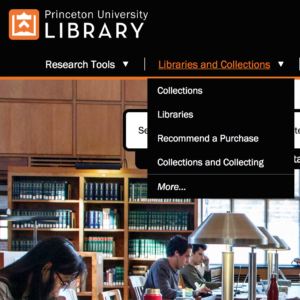The Princeton University Library system features over six million unique titles. So when you discover a book not already in the system, you know you’ve found a niche topic.
This semester, I’m taking a course called “Modern India: History and Political Theory” taught by Visiting Professor Sunil Khilnani. In the course, we examine primary sources from the major actors in the Indian nationalist movement.

Interested in indigenous politics in India, I asked Professor Khilnani if I could write my midterm paper on the Adivasi (Indian tribal societies) role in Independence – even though we haven’t addressed this topic in class. He suggested I focus on Jaipal Singh, a major twentieth-century Adivasi activist, and sent me a list of primary and secondary sources to consider. Specifically, he recommended using the recently published collection of Singh’s speeches and writings, Adivasidom.
To my surprise, Adivasidom was not in the Princeton University Library system. It wasn’t just checked out: it didn’t exist in the catalogue. I was frustrated, but also excited to have this rare opportunity to use one of my favorite features of the PUL website: Recommend a Purchase.
In the rare moments when a book isn’t listed in the library catalogue, students can ask the library to purchase the title and reserve it for their use. The service is free and as easy as online shopping.
To access the form, go to the Princeton University Library’s home page and select “Recommend a Purchase” in the “Libraries and Collections” drop-down menu. Or you can just click here.
All you need to do is enter your name and contact information, the book’s publication details, and the context of your request (coursework, general reading, research). The form also enables you to choose to be notified when the book arrives. After you submit the request, it is forwarded to the appropriate librarian who may reach out to you to update you on the purchase. Even if the library chooses not to purchase the book, you should be connected with a librarian who can help you with your specific research needs.
In my case, Dr. Magier, the South Asia Librarian, emailed me within a few hours of my purchase request. He informed me that Adivasidom was only available from a single publisher in India and could only be shipped from Bangalore. The book probably wouldn’t get to campus in time for my midterm (it didn’t), but Dr. Magier said he had rush-ordered it and would notify me when it arrived.
This is just one example of the support available to each student through the Princeton University Library system (check out Emma’s recent post on subject librarians). The library’s collections aren’t meant to limit our ideas, but to provide the foundation for our research. Venturing beyond the well-worn paths of the stacks is encouraged and library services like “Recommend a Purchase” enable us to access even the most eccentric of academic texts.
–Rafi Lehmann, Social Sciences Correspondent

